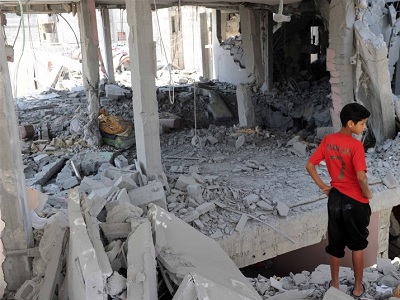
By Annie Slemrod
Gulf Arab states and Turkey have spectacularly failed to fulfill their pledges to Gaza, contributing to a two-thirds shortfall in promised assistance to the beleaguered enclave, a new report reveals.
Qatar has delivered just 10 percent of the $1 billion it promised, while Saudi Arabia, Turkey and Kuwait between them have handed over just over $50 million of the $900 million they pledged, according to a new World Bank report.
Last summer’s war between Israel, Hamas and other Islamist militants killed more than 2,000 Palestinians – mostly civilians – and left more than 100,000 homeless by the time of an August ceasefire.
Despite concerns about political instability and the possibility of renewed conflict, the international community came out in force at an October conference in Cairo, promising $3.5 billion to help Gaza rebuild.
The release of the World Bank’s numbers comes a month after UNRWA, the UN agency for Palestine refugees, said that not a single one of the more than 5,000 completely destroyed homes in Gaza had been rebuilt.
Big Donors Come up Short
Although $5.4 billion was widely vaunted as the takeaway figure from the Cairo conference, only $3.5 billion of it was actually allocated to Gaza.
As of late April, donors had given only 27.5 percent of the promised $3.5 billion, or $967 million.
However, only 35 percent of the aid pledged – or $1.2 billion – was actually fresh, with the majority coming from reallocated donations and emergency funding delivered as the bombs were still falling. Of this new aid, just 13.5 percent – or $165 million – has come through.
Qatar pledged $1 billion for Gaza and has delivered 10 percent; Saudi Arabia has given only 10 percent of its promised $500 million. Turkey and Kuwait both pledged $200 million: the former has produced only $520,000, and the latter none.
Other top pledges included the United Arab Emirates’ $200 million, which the World Bank said no data was available for, the United States’ $277 million pledge, which is 84 percent delivered, and the European Union’s $348 million, with a 40 percent delivery rate.
Gulf states have become increasingly important donors in recent years, providing hundreds of millions of dollars to emergencies across the globe. Last year, Saudi Arabia pledged $500 million to Iraq, while it recently announced it would fill the entirety of a $274 million appeal for Yemen.
Yet they have also been known to work outside the traditional humanitarian system, while there have been complaints of late payments (although Kuwait has been among the fastest states to turn pledges for Syria into cheques in the UN’s name).
IRIN asked Saudi Arabian, Qatari and Kuwaiti representatives for comment, but had not received responses by the time of publication.
Still Blockaded
Although the donation shortfall is significant, the World Bank argues that the major obstacle to reconstruction is “not financing, but the limitations on imports of construction materials into Gaza.”
Israel insists crippling restrictions are necessary for its security – it contends that in the past Hamas repurposed construction materials to build underground tunnels that it uses to store weaponry and attack Israeli citizens.
Following a ceasefire agreement, a mechanism was set up to track the flow of goods for reconstruction in Gaza. But the territory’s economy remains largely closed off from the West Bank, Israel and Egypt – a factor that has hampered economic growth. Residents require permits to leave the territory, and these are only granted in limited circumstances.
The recent conflict further devastated the territory’s economy. The World Bank estimates Gaza’s GDP will be $530 million less in 2015 than it would have been without the war.
Since the fighting, unemployment has jumped 11 percent to 44 percent, “probably the highest in the world,” the Bank said. Sixty percent of young people are out of a job, and 80 percent of the strip’s 1.8 million residents receive some sort of aid.
Steen Lau Jorgensen, the World Bank’s Country Director for the West Bank and Gaza, called the outlook for Gaza “very troubling”.
“The ongoing blockade and the 2014 war have taken a toll on Gaza’s economy and people’s livelihoods,” he said in a statement, commenting on the near disappearance of exports and a 60 percent shrink in manufacturing. “The economy cannot survive without being connected to the outside world.”
(IRIN – www.irinnews.org)




